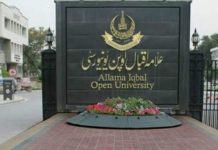ISLAMABAD, Mar 07 (APP/DNA): Ministry of Federal Education and Professional Training had achieved significant milestones over the past year in its mission to develop Pakistan as a progressive and prosperous nation by ensuring quality education and skill development for all citizens. According to the official details, with a vision of providing equal educational opportunities, the education ministry has implemented numerous initiatives across various sectors.
One of the flagship initiatives, the Prime Minister’s School Meal Program, provides free meals to 65,000 students daily, enhancing both their health and academic performance. To improve healthcare access, 100 Mother and Child Health Centers have been established across educational institutions.
In a push toward modern education, seven AI and robotics labs have been set up in schools across the Islamabad Capital Territory (ICT). Additionally, in collaboration with NUML, language training has been provided to 1,000 students, enhancing global communication skills.
The Pink Bus Initiative has introduced twenty new buses offering free transportation services for women and girls, ensuring safer and more accessible education.
On the technology front, sixteen colleges have been equipped with technology training centers, and fifty digital learning hubs have been established in rural areas. Furthermore, 130 Chromebook labs and 1,000 Chromebooks have been distributed across 104 schools, while 100 schools now feature smart classrooms with LED screens and smart boards. Coding and robotics training has also been introduced to primary students in 150 schools.
In the realm of vocational and entrepreneurial training, 19 skill labs have been launched in Federal Directorate of Education (FDE) schools, and 25,000 teachers have been trained in financial literacy. A new entrepreneurship curriculum has been introduced to foster innovation.
For early childhood and special education, 100 early childhood education centers have been set up to ensure quality foundational education, and special education centers have been included in the meal program to support differently-abled students.
Sustainability initiatives have seen solar power systems installed in 100 institutions, promoting green energy, while 50 daycare centers have been established in educational institutions to support working women. Through the National Vocational & Technical Training Commission (NAVTTC), 56,000 youth have been trained in IT and job-oriented trades, and the “She Fixes” initiative aims to empower women in technical fields.
A National Job Portal has been launched to connect skilled workers with employers, and international certification programs have been introduced to enhance global employability. Short courses in high-demand fields such as IT and healthcare have also been developed.
Reforms in private and religious education include the implementation of Standard Operating Procedures (SOPs) for private institutions and the development of a grievance redressal mechanism for complaints. Efforts are underway to integrate Madaris (religious schools) into the mainstream educational system. On the national curriculum and examination front, a phased implementation of the National Curriculum has been underway since 2022-23, and FBISE is transitioning to digital exams, reducing reliance on rote learning. A new grading system focusing on conceptual understanding has been introduced.
Public engagement initiatives have seen 40 gyms established, with 20,000 tracksuits and 500 sports kits distributed.
A girls’ sports gala saw participation from over 4,000 young athletes nationwide, and the Summer Fiesta provided training in IT, creative arts, and personal development.
The Pakistan Learning Festival promoted creativity through STEAM education, robotics, storytelling, and teacher training programs. Cultural and educational conferences, such as the Kashmir Jannat Nazeer event and the International Girls’ Education Conference, have celebrated heritage and highlighted challenges and opportunities for female education in Muslim societies.
The ministry allocated a total budget of PKR 122,881,262, with key expenditures including Basic Pay & Allowances of PKR 41,965,388 and Research & Operations of PKR 80,915,874.
The implemented policies have resulted in improved learning outcomes, reduced malnutrition, increased healthcare access for female students and teachers, enhanced technical and vocational skills among students, better employment prospects both locally and internationally, greater participation of women in education and employment sectors, and strengthened STEM education and digital transformation efforts.
Policy and legislative developments have focused on increasing digital literacy and tech adaptation in education, enhancing freelancing and e-commerce opportunities, strengthening financial literacy and sustainable planning, integrating TVET (Technical and Vocational Education and Training) into religious education, simplifying registration processes for private education providers, and shifting from rote memorization to conceptual learning at the national examination level.
The Ministry of Federal Education continues its commitment to modernizing Pakistan’s education system, integrating technology, and improving access to quality education for all citizens, ensuring a skilled and competitive workforce for the future.

















